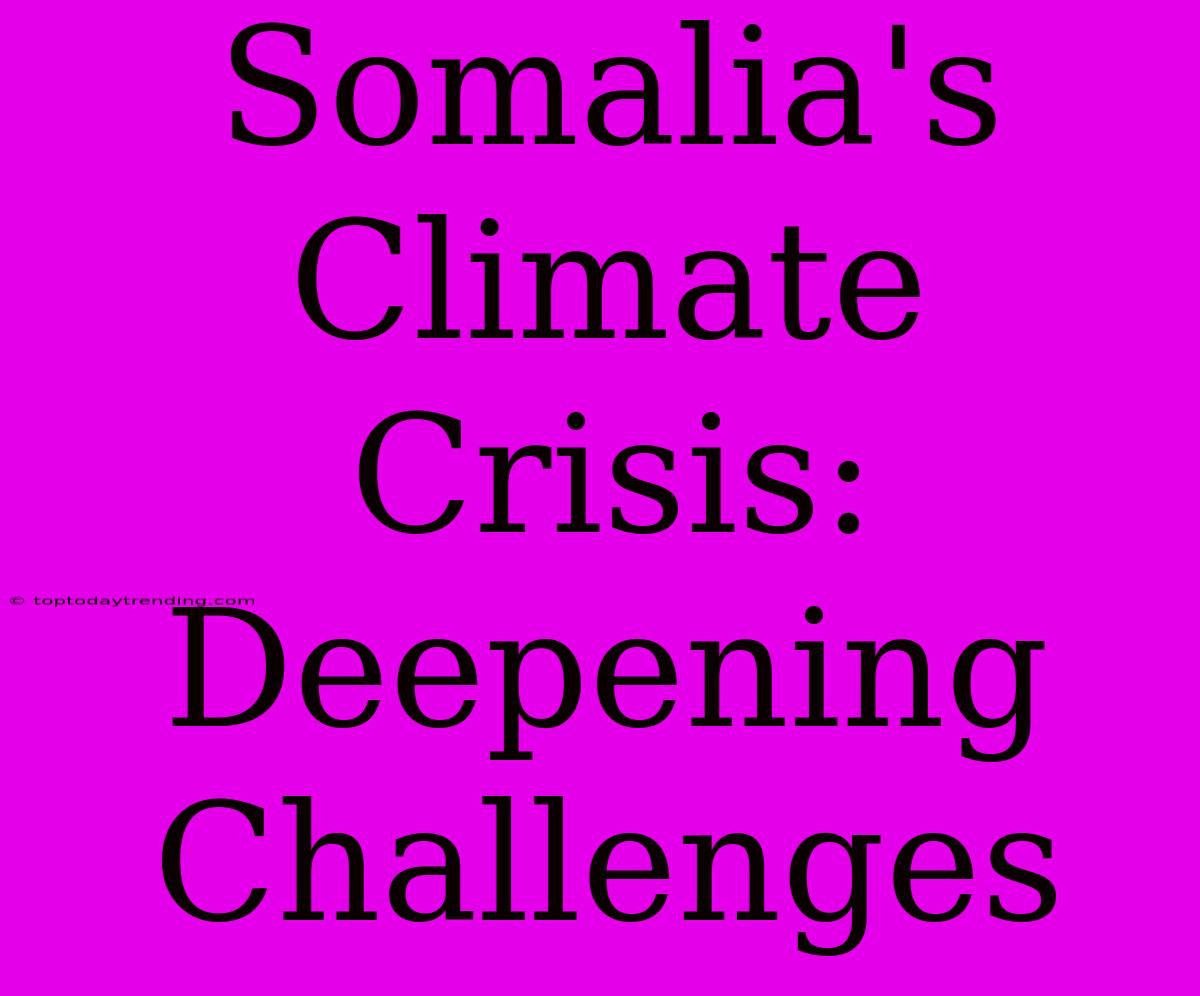Somalia's Climate Crisis: Deepening Challenges
Somalia, a nation already grappling with protracted conflict and instability, is facing an escalating climate crisis, exacerbating existing vulnerabilities and pushing the country towards a humanitarian catastrophe. From devastating droughts to frequent floods, the impacts of climate change are becoming increasingly severe, leaving communities struggling to survive.
A Land in the Grip of Drought
Drought, a recurring phenomenon in Somalia, has reached alarming levels in recent years. The country has been experiencing a prolonged drought since 2016, with the most recent drought impacting millions of people across the country.
Impacts:
- Water scarcity: Dwindling water sources, including wells and rivers, have drastically reduced access to safe drinking water, forcing communities to rely on contaminated sources.
- Livestock loss: The drought has decimated livestock populations, a critical source of livelihood for many Somali pastoralists.
- Food insecurity: With widespread crop failures and dwindling livestock, food insecurity has reached alarming levels, leading to widespread malnutrition and hunger.
- Mass displacement: Millions of Somalis have been displaced due to the lack of resources, increasing the strain on already overstretched humanitarian assistance.
The Rising Tide of Floods
While droughts dominate the narrative, flooding is also a growing threat, with the consequences often devastating. The country's fragile ecosystems are highly susceptible to extreme weather events, with heavy rainfall and coastal flooding becoming more frequent and intense.
Impacts:
- Infrastructure damage: Flooding has damaged critical infrastructure, including roads, bridges, and water systems, disrupting access to essential services.
- Disease outbreaks: Stagnant water and poor sanitation after floods create breeding grounds for disease-carrying mosquitoes, leading to outbreaks of malaria, cholera, and other waterborne diseases.
- Crop and livestock loss: Flooding can destroy crops and livestock, exacerbating food insecurity and further impacting livelihoods.
A Perfect Storm: Climate Change and Conflict
Somalia's climate crisis is further complicated by the ongoing armed conflict. The instability and displacement caused by conflict exacerbate the vulnerability of communities to the impacts of climate change, making it difficult for them to cope and adapt.
Consequences:
- Competition for resources: Dwindling resources due to climate change further fuels competition for land, water, and grazing areas, contributing to conflict and displacement.
- Humanitarian access: Conflict zones often become inaccessible to aid organizations, hindering the delivery of life-saving assistance to communities in need.
- Displaced populations: Conflict and climate change have combined to create a massive displacement crisis, with millions of people living in makeshift camps with limited access to essential services.
A Call to Action: Mitigation and Adaptation
Addressing the climate crisis in Somalia requires a multifaceted approach that focuses on both mitigation and adaptation.
Mitigation:
- Reducing greenhouse gas emissions: This includes transitioning to renewable energy sources, promoting sustainable agriculture practices, and improving forest management.
- International cooperation: Global efforts are crucial to reduce the overall impact of climate change, especially for countries like Somalia that are highly vulnerable to its consequences.
Adaptation:
- Strengthening early warning systems: Investing in early warning systems can provide communities with timely information about upcoming droughts, floods, and other climate-related events, enabling them to better prepare and respond.
- Promoting climate-resilient agriculture: Developing drought-resistant crops and livestock breeds can help communities adapt to changing climate conditions and ensure food security.
- Improving water management: Building water harvesting and irrigation systems can improve access to clean water for both human consumption and agricultural use.
- Supporting community-based initiatives: Empowering local communities to participate in climate change adaptation and mitigation efforts is essential for achieving long-term success.
The climate crisis in Somalia poses a grave threat to the country's future, requiring a concerted effort from all stakeholders to address its multifaceted challenges. By investing in mitigation and adaptation measures, and by fostering a collaborative approach to development and humanitarian assistance, there is a real opportunity to build a more resilient Somalia for future generations.

